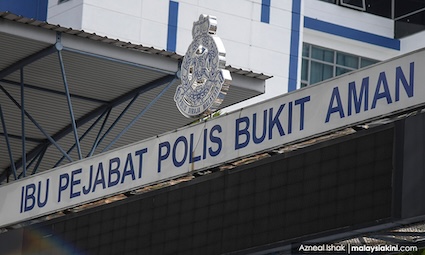Reforming the Malaysian Special Branch

Special Branch needs to be separated from the Royal Malaysian Police
Murray Hunter
Back in 2019, the Malaysian Human Rights Commission (Suhakam) completed a public inquiry which found that Amri Che Mat and Pastor Raymond Koh were victims of enforced disappearance, perpetrated by members of the Special Branch.
The modus operandi of both abductions had similarities and were conducted by a professional force.
With the abductions showing all the hallmarks of and extra-judicial action and thus, above the law, the Special Branch must be made more accountable.
The Special Branch is currently a secretive division within the Royal Malaysian Police Force (PDRM), where the channels of responsibility, authority, and accountability is opaque.
The Special Branch is not subject to any act of parliament, nor has any public charter. It doesn’t report of the parliament, or to the executive in any official manner. There is nothing within the law that requires the Special Branch to do so. The Special Branch only reports to the Inspector General of the Police (IGP).
The only indication of the mission and objectives of the Special Branch is a page stating that the Special Branch is responsible for collecting and processing security intelligence to preserve the law and order of the public and maintain Malaysia’s peace and security.
The Special Branch originally focused on collecting intelligence on communist insurgents and unionists. This quickly expanded to opposition politicians, NGOs, and activists. Just about every significant organization in Malaysia has been infiltrated by the Special Branch with its 10,000 employees and 10-15 thousand informers operating across the country.
The Special Branch runs surveillance, intelligence gathering, and infiltration operations that span all aspects of Malaysian society, including religious organizations, mosques, churches and temples, Chinese schools, universities, state and federal civil services, government agencies, local government, NGOs, media organizations, social activists, and even the Royal households.
The Special Branch attends many public meetings and gatherings, press conferences, and events, where there are people of interest. This includes overseas locations, where Malaysians are active. In addition, both opposition and government MPs are kept under surveillance.
Today, the Special Branch has a budget in excess of RM500 million, which doesn’t include slush funds it has available to fund secret and sensitive operations. Some of these operations are ‘off the books’, and potentially outside the law, and subject to any form of review.
It is necessary to break the Special Branch away from the PDRM. By breaking the Special Branch away from the rest of the police force, the organization can have its own special charter and be made accountable to some external branch of government, such as the parliament or executive. The pros and cons as to which authority the Special Branch should report to can be debated. What is important is that any new charter will allow judicial reviews of the organization’s operations.
In addition, Malaysia has become a large enough and complex society with specific national security threats, where a specialized organization like the Special Branch can focus upon. This has occurred to Special Branches all over the world. Singapore, has detached from the police force, independent, and called the Internal Security Department (ISD). Australia has the Australian Security Intelligence Organization (ASIO), and Britain MI5.
Breaking away the Special Branch from the PDRM will make the organization more accountable, and keep the Special Branch in check. The Special Branch should not be allowed to hide within the organization structure of the PDRM. The Special Branch should be allowed to grow independently to allow it to grow and meet the needs of a modern Malaysia.
This should enhance the Special Branch to meet the growing national security needs of the nation.
Originally published in the Eurasia Review 20th November 2023

